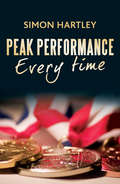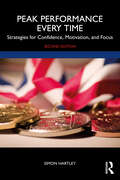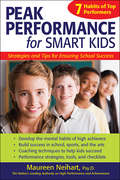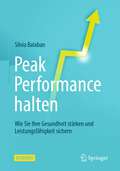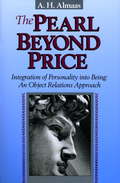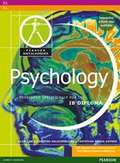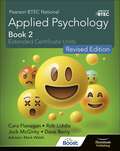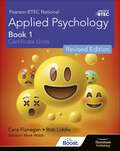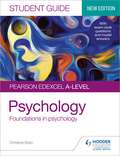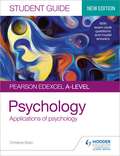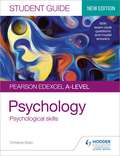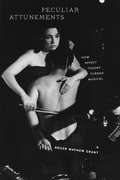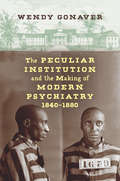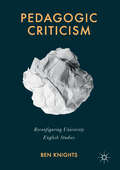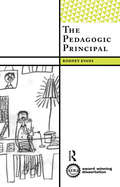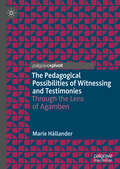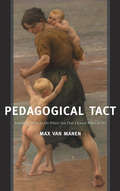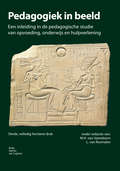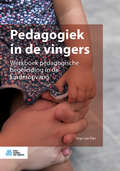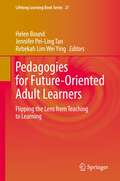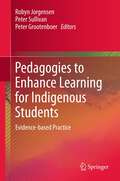- Table View
- List View
Peak Performance Every Time
by Simon HartleyPeak performances should not be left to chance. Rather than hoping that you will perform at your best, why not engineer your performance? Peak Performance Every Time incorporates principles from sport psychology and performance coaching and applies these to all areas of life. Using illustrations and real-world examples from top athletes and business executives, it focuses on the three main components that underpin performance: Confidence Motivation Focus. As well as offering practical strategies to help the reader achieve their optimal mindset, it also explains how to coach others to perform to their potential. Throughout, the book is underpinned by theoretical frameworks, literature and research findings and will be invaluable to anyone trying to reach their full potential, in particular athletes, coaches, managers and executives. It may also be of interest to sports psychology, management and business students.
Peak Performance Every Time: Strategies for Confidence, Motivation, and Focus
by Simon HartleyMost people have good days…and not so good days. When they step back and ask what makes the difference, many conclude that it’s that stuff that happens between their ears. So, how do we engineer our mindset? How do we get our mental game right, so that we can perform at our best, consistently? Peak Performance Every Time provides readers with a detailed look into how to build the critical components of a great mental game. It will help them to hone their focus, control their confidence, master motivation and deliver their best ‘under pressure’. In short, it will help deliver peak performance, every time. The book provides a practical guide to performance psychology, based on approaches and methods that have been tried and tested in the demanding world of elite sport. In addition to applied practice, it provides real life examples and case studies from both elite sport and business, plus the underpinning theory and research. This book will be invaluable to anyone trying to reach their full potential, in particular athletes, coaches, managers and executives. It may also be of interest to sports psychology, management and business students.
Peak Performance for Smart Kids
by Maureen NeihartPeak Performance for Smart Kids provides success strategies, activities, tools, real-life examples, and checklists for parents to employ to help their kids achieve to their highest potential. Even the most talented child will not succeed if he or she has not developed the mental, psychological, and emotional skills to face the heavy demands of high performance. Maureen Neihart, a psychologist and leading authority on talent development in children, examines seven mental habits of successful kids, providing practical approaches for developing them in talented children of all ages in this easy-to-read guide for parents and teachers.By working with parents to complete the activities included in this book, high-ability kids will learn to manage stress and anxiety, set and achieve goals, use mental rehearsal to improve performance, manage their moods and emotions, practice optimistic thinking, and resolve their frustrations of needing to belong while needing to achieve. With its research-based strategies and unique approach to maximizing potential, this is a book from which every parent of smart kids can benefit!
Peak Performance halten: Wie Sie Ihre Gesundheit stärken und Leistungsfähigkeit sichern
by Silvia BalabanAls Leistungsträger liefern Sie 24/7 mentale Höchstleistung: zunehmende Arbeitsverdichtung, Entscheidungsdauerfeuer und ASAP-isierung gekoppelt mit ständiger Erreichbarkeit und den Folgen von Globalisierung, sowie wirtschaftlichen und politischen Krisen. All das zehrt an Ihrer Energie. All das geht auf Kosten Ihrer Gesundheit. Um ein Auspowern zu vermeiden, ist ein wirkungsvolles, wissenschaftlich fundiertes Trainings- und Regenerationskonzept erforderlich, wie es im Leistungssport seit Jahren Standard ist. Daher bilden neueste Methoden und objektiv messbare Daten aus der Stressmedizin die Basis dieses Buches. Erfahren Sie, wie Sie durch biochemische und biophysische Parameter Ihre Kraft und Regeneration qualitativ verbessern können, denn Fakten schaffen Sicherheit. Praxisnah und leicht verständlich informiert dieser Ratgeber mit Selbstchecks, Fallbeispielen und Praxistipps über die wichtigsten Gesundheitsgrundlagen für berufliche Peak Performance Situationen. Fundiertes Wissen, damit Sie neue Stärke tanken und zukünftige Herausforderungen wieder mit Gelassenheit meistern können.
The Pearl Beyond Price: Integration of Personality into Being, an Object Relations Approach
by A. H. AlmaasIn this book Almaas demonstrates that healthy ego development is part of the continuum of spiritual development. He also establishes the possibility of attaining inner realization and developing our essential being--"the pearl beyond price"--in the context of living a normal human life.
Pearson Baccalaureate Psychology
by Alan Law Christos Halkiopoulos Christian Bryan-ZaykovA textbook for students and teachers of the International Baccalaureate Diploma, written and developed by practicing IB teachers.
Pearson BTEC National Applied Psychology: Book 2
by Cara Flanagan Dave Berry Jock McGinty Mark Walsh Rob LiddlePublishing Spring 2022. / Both BTEC Applied Psychology Books 1 and 2 are being revised to match the revised Unit 1 and Unit 3 specifications for first teaching from September 2021. / Unit 3 - Health psychology completely revised and updated. / Endorsed for BTEC. / Each book provides knowledge and evaluation of theories and studies combined with many engaging activities which deliver the vocational element. / Activities aim to prepare students for internal and external assessments. / The brilliant visual style and tone will encourage students through every step of the course.
Pearson BTEC National Applied Psychology: Book 1 Revised Edition
by Cara Flanagan Mark Walsh Rob LiddlePublishing Spring 2022. / Both BTEC Applied Psychology Books 1 and 2 are being revised to match the revised Unit 1 and Unit 3 specifications for first teaching from September 2021. / Unit 1 - Psychological approaches and applications completely revised and updated. / Endorsed for BTEC. / Each book provides knowledge and evaluation of theories and studies combined with many engaging activities which deliver the vocational element. / Activities aim to prepare students for internal and external assessments. / The brilliant visual style and tone will encourage students through every step of the course.
Pearson Edexcel A-level Psychology Student Guide 1: Foundations in psychology
by Christine BrainReinforce understanding throughout the course with clear topic summaries and sample questions and answers to help students target higher grades.Written by experienced teacher and subject expert Christine Brain, our Student Guides are divided into two key sections - content guidance, and sample questions and answers.Content guidance will:- - Develop understanding of key concepts and terminology; this guide covers foundations in psychology: social psychology, cognitive psychology, biological psychology and learning theories.- - Consolidate knowledge with 'knowledge check questions' at the end of each topic and answers in the back of the book.Sample questions and answers will:- - Build understanding of the different question types, so that students can approach each question with confidence.- - Enable students to target top grades in Paper 1 with sample answers and commentary explaining exactly why marks have been awarded.
Pearson Edexcel A-level Psychology Student Guide 1: Foundations in psychology
by Christine BrainReinforce understanding throughout the course with clear topic summaries and sample questions and answers to help students target higher grades.Written by experienced teacher and subject expert Christine Brain, our Student Guides are divided into two key sections - content guidance, and sample questions and answers.Content guidance will:- - Develop understanding of key concepts and terminology; this guide covers foundations in psychology: social psychology, cognitive psychology, biological psychology and learning theories.- - Consolidate knowledge with 'knowledge check questions' at the end of each topic and answers in the back of the book.Sample questions and answers will:- - Build understanding of the different question types, so that students can approach each question with confidence.- - Enable students to target top grades in Paper 1 with sample answers and commentary explaining exactly why marks have been awarded.
Pearson Edexcel A-level Psychology Student Guide 2: Applications of psychology
by Christine BrainReinforce understanding throughout the course with clear topic summaries and sample questions and answers to help students target higher grades.Written by experienced teacher and subject expert Christine Brain, our Student Guides are divided into two key sections - content guidance, and sample questions and answers.Content guidance will:- - Develop understanding of key concepts and terminology; this guide covers applications of psychology: clinical, criminological, child and health psychology.- - Consolidate knowledge with 'knowledge check questions' at the end of each topic and answers in the back of the book.Sample questions and answers will:- - Build understanding of the different question types, so that students can approach each question with confidence.- - Enable students to target top grades in Paper 2 with sample answers and commentary explaining exactly why marks have been awarded.
Pearson Edexcel A-level Psychology Student Guide 2: Applications of psychology
by Christine BrainReinforce understanding throughout the course with clear topic summaries and sample questions and answers to help students target higher grades.Written by experienced teacher and subject expert Christine Brain, our Student Guides are divided into two key sections - content guidance, and sample questions and answers.Content guidance will:- - Develop understanding of key concepts and terminology; this guide covers applications of psychology: clinical, criminological, child and health psychology.- - Consolidate knowledge with 'knowledge check questions' at the end of each topic and answers in the back of the book.Sample questions and answers will:- - Build understanding of the different question types, so that students can approach each question with confidence.- - Enable students to target top grades in Paper 2 with sample answers and commentary explaining exactly why marks have been awarded.
Pearson Edexcel A-level Psychology Student Guide 3: Psychological skills
by Christine BrainReinforce understanding throughout the course with clear topic summaries and sample questions and answers to help students target higher grades.Written by experienced teacher and subject expert Christine Brain, our Student Guides are divided into two key sections - content guidance, and sample questions and answers.Content guidance will:- - Develop understanding of key concepts and terminology; this guide covers psychological skills, including methods, a synoptic review of studies, issues and debates.- Consolidate knowledge with 'knowledge check questions' at the end of each topic and answers in the back of the book.Sample questions and answers will:- - Build understanding of the different question types, so that students can approach each question with confidence.- - Enable students to target top grades in Paper 3 with sample answers and commentary explaining exactly why marks have been awarded.
Pearson Edexcel A-level Psychology Student Guide 3: Psychological skills
by Christine BrainReinforce understanding throughout the course with clear topic summaries and sample questions and answers to help students target higher grades.Written by experienced teacher and subject expert Christine Brain, our Student Guides are divided into two key sections - content guidance, and sample questions and answers.Content guidance will:- - Develop understanding of key concepts and terminology; this guide covers psychological skills, including methods, a synoptic review of studies, issues and debates.- Consolidate knowledge with 'knowledge check questions' at the end of each topic and answers in the back of the book.Sample questions and answers will:- - Build understanding of the different question types, so that students can approach each question with confidence.- - Enable students to target top grades in Paper 3 with sample answers and commentary explaining exactly why marks have been awarded.
Peculiar Attunements: How Affect Theory Turned Musical
by Roger Mathew GrantPeculiar Attunements places the recent turn to affect into conversation with a parallel movement in European music theory of the eighteenth century. During that time the affects—or passions, as they were also called—formed a vital component of a mimetic model of the arts. Eighteenth-century critics held that artworks imitated or copied the natural world in order to produce copies of the affects in their beholders. But music caused a problem for such theories, since it wasn’t apparent that musical tones could imitate anything with any dependability, beyond the rare thunderclap or birdcall.Struggling to articulate how it was that music managed to move its auditors without imitation, certain theorists developed a new affect theory crafted especially for music, postulating that music’s physical materiality as sound vibrated the nerves of listeners and attuned them to the affects through sympathetic resonance. This was a theory of affective attunement that bypassed the entire structure of representation, offering a non-discursive, corporeal alternative. It is a pendant to contemporary theories of affect, and one from which they have much to learn. Inflecting our current intellectual moment through eighteenth-century music theory and aesthetics, this book offers a reassessment of affect theory’s common systems and processes. It offers a new way of thinking through affect dialectically, drawing attention to patterns and problems in affect theory that we have been given to repeating. Finally, taking a cue from eighteenth-century theory, it gives renewed attention to the objects that generate affects in subjects.
The Peculiar Institution and the Making of Modern Psychiatry, 1840–1880
by Wendy GonaverThough the origins of asylums can be traced to Europe, the systematic segregation of the mentally ill into specialized institutions occurred in the United States only after 1800, just as the struggle to end slavery took hold. In this book, Wendy Gonaver examines the relationship between these two historical developments, showing how slavery and ideas about race shaped early mental health treatment in the United States, especially in the South. She reveals these connections through the histories of two asylums in Virginia: the Eastern Lunatic Asylum in Williamsburg, the first in the nation; and the Central Lunatic Asylum in Petersburg, the first created specifically for African Americans. Eastern Lunatic Asylum was the only institution to accept both slaves and free blacks as patients and to employ slaves as attendants.Drawing from these institutions' untapped archives, Gonaver reveals how slavery influenced ideas about patient liberty, about the proper relationship between caregiver and patient, about what constituted healthy religious belief and unhealthy fanaticism, and about gender. This early form of psychiatric care acted as a precursor to public health policy for generations, and Gonaver's book fills an important gap in the historiography of mental health and race in the nineteenth century.
Pedagogic Criticism
by Ben KnightsThis book argues that the history of English Studies is embedded in its classroom practice, and its practice in its history. Some of its foundational struggles are still being lived out today. English is characterized as a 'boundary' subject, active in dialogue across a number of imagined borders, especially those between academic and non-specialized readerships. While the subject discipline maintains strong pedagogic principles, many of its principles and values are obscure or even invisible to students and potential students. The book cross-fertilizes the study of English as a subject with the analysis of selected literary texts read as pedagogic parables. It concludes with a call for a return to the subject's pedagogic roots.
The Pedagogic Principal (International Institute for Qualitative Methodology Series)
by Rodney EvansUsing an innovative research strategy including empirical, interpretive, and narrative strands, Rod Evans reorients studies of educational administration that have been dominated by organizational theory originating in the world of industry and commerce. Building on a foundation of pedagogical and phenomenological inquiry, he examines administrators’ concrete, lived experience, or “lifeworld practice.” In reconstituting educational administration as pedagogical practice, Evans draws conclusions with profound implications for schools and administrators of every stripe.
The Pedagogical Possibilities of Witnessing and Testimonies: Through the Lens of Agamben
by Marie HållanderThis book explores the pedagogical possibilities of testimony and witnessing. Drawing on the work of Giorgio Agamben, this book highlights the ultimate impossibility of witnessing and testimony: testimonies do not stand outside language, history, politics, or capitalist systems. Through analysis of different aspects of representation, subjectivity and emotions, this book illustrates how testimonies can be used as a way to control student emotions, perceptions and understandings. Testimonies used within teaching can work as a way to reproduce stereotypes of suffering, and can thus consolidate and reinforce exisiting power structures and identities. By exploring these difficulties, the author argues for the value of teaching historical testimonies of suffering that recognize both the impossibilities and possibilities of witnessing and testimony.“Marie Hållander has provided an indispensable guide to re-thinking the pedagogical possibilities of witnessing and testimonies, essential reading for anyone interested in how to approach these topics both critically and pedagogically. Through a lucid theoretical synthesis, this book re-inscribes a dynamic pedagogical dimension into the topics of witnessing and testimony, which have been dominated by historians, psychologists and literary critics. Thinking through the theoretical challenges of witnessing and testimony yet using powerful examples from teaching, Hållander develops a forceful analysis that shows the profound implications of these topics for pedagogical practice.” —Michalinos Zembylas, Open University of Cyprus, Cyprus “Timely and topical, this fascinating book complicates approaches to witnessing, suffering and testimony without diminishing the pedagogical, historical and political significance of sharing, or harkening to, one’s experience. It is a powerful, original and valuable contribution in its field, not only because it weaves its themes in a diligent, reflective and critical manner, but also because it has its own, unique perspective and sensibilities, as these emerge from erudite combination of narrative, pedagogy and philosophy.” —Marianna Papastephanou, University of Cyprus, Cyprus
Pedagogical Tact: Knowing What to Do When You Don’t Know What to Do (Phenomenology of Practice #1)
by Max Van ManenPedagogical Tact describes how teacher-student relations possess an improvisational and ethical character. The daily realities of educators, parents, and childcare specialists are pedagogically conditioned by sensitive insights, active thoughtfulness, and the creative ability to act caringly and appropriately in the immediacy of the moment. Internationally known educator Max van Manen shows through recognizable examples and evocative stories how good teaching is driven by the phenomenology of pedagogy. His book-refocuses educators and others away from an emphasis on instrumental skills and technocratic programs toward the need for pedagogical tact;-describes how pedagogical actions have latent effects that will influence children throughout their lives;-shows how our actions with young people have pedagogically ethical and moral significance;-gives educators back their original vocational motivation and inspiration.
Pedagogiek in beeld: Een inleiding in de pedagogische studie van opvoeding, onderwijs en hulpverlening
by L. Rosmalen M. H. IJzendoornPedagogiek in beeld biedt een kijkje in de wetenschappelijke keuken van de pedagogiek en is daarmee een inleiding in de studie van opvoeding, onderwijs en hulpverlening. Het boek geeft een helder beeld van enkele belangrijke uitkomsten van pedagogisch onderzoek in Nederland en laat zien hoe die resultaten tot stand zijn gekomen. Daarbij komen de belangrijkste werkvelden aan bod: algemene pedagogiek, gezinspedagogiek, orthopedagogiek, leerproblemen en onderwijspedagogiek. Concrete voorbeelden van onderzoek maken duidelijk wat de pedagogiek heeft gepresteerd en wat in de toekomst van deze discipline mag worden verwacht.
Pedagogiek in de vingers: Werkboek pedagogische begeleiding in de kinderopvang
by Inge Van RijnDit werkboek geeft praktijkgerichte adviezen om met pedagogisch medewerkers in gesprek te gaan over hun werk. Het laat zien hoe je samen na kunt denken over de pedagogische taken van het kindercentrum. Sinds 2019 moet iedere pedagogisch medewerker worden gecoacht door een pedagogisch begeleider. Dat stelt de wet Innovatie Kwaliteit Kinderopvang (IKK) verplicht. Kindercentra zitten te springen om goed opgeleide begeleiders. Met dit boek krijgen opleidingen en begeleiders in kindercentra praktische ‘tools’ aangereikt waarmee ze direct in de praktijk aan de slag kunnen. Bij ieder hoofdstuk staan concrete opdrachten en tips. Het boek is geschreven in een taal die de medewerkers uit de kinderopvang begrijpen en die hen aanspreekt. De alledaagse praktijk van de kinderopvang komt tot leven in sprekende voorbeelden. Dringende pedagogische vragen komen aan bod. Hoofdpersonen in het boek zijn de pedagogisch medewerkers: hun taken op de werkvloer staan centraal.
Pedagogies for Future-Oriented Adult Learners: Flipping the Lens from Teaching to Learning (Lifelong Learning Book Series #27)
by Helen Bound Jennifer Pei-Ling Tan Rebekah Lim Wei YingThis book presents a collection of chapters—both empirical and conceptual—that challenge existing paradigms of learning and teaching, provides examples of pedagogical spaces and practices that nurture future-oriented learners, explicates identities and transitions in learning, and offers alternative frames for moving forward.Educational structures have proven remarkably resilient. More often than not, pedagogical designs still privilege the lecture-tutorial format, front-end loading and the positioning of the ‘teacher’ as expert. In a similar vein, pedagogical spaces tend to privilege the formal educational institution and its discourses, rather than productively engage with naturally-occurring learning spaces at work and in communities. To better prepare and support learners for dynamically changing futures, we need to truly flip the lens from teaching to learning, positioning at the core, the learner in contexts where learning and becoming occurs. This means considering what counts as a future-oriented learner and educator, recognising the importance of evolving identities, transitions and pathways that facilitates the processes of being and becoming. Equally important is the design and appropriation of pedagogical spaces and practices that are in themselves dynamic and future-oriented. This book questions the current delineation between the spaces of work, learning and communities.
Pedagogies to Enhance Learning for Indigenous Students
by Peter Sullivan Peter Grootenboer Robyn JorgensenThis book describes research undertaken by leading Australian researcher in Indigenous communities. While the chapters are Australian in their focus, the issues that are discussed are similar to those in other countries where there are indigenous people. In most cases, in Australia and internationally, Indigenous learners are not succeeding in school, thus making the transition into work and adulthood quite tenuous in terms of mainstream measures. The importance of being literate and numerate are critical in success in school and life in general, thus making this collection an important contribution to the international literature. The collection of works describes a wide range of projects where the focus has been on improving the literacy and numeracy outcomes for Indigenous students. The chapters take various approaches to improving these outcomes, and have very different foci. These foci include aspects of literacy, numeracy, curriculum leadership, ICTs, whole school planning, policy, linguistics and Indigenous perspectives. Most of the chapters report on large scale projects that have used some innovation in their focus. The book draws together these projects so that a more connected sense of the complexities and diversity of approaches can be gleaned.
